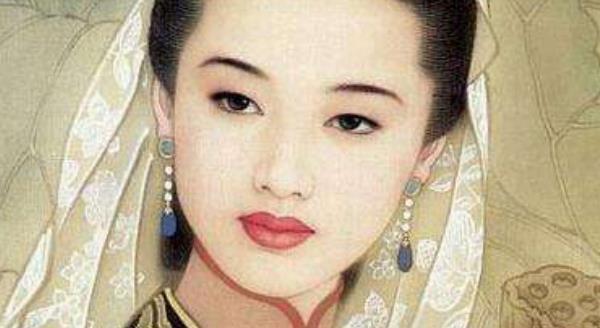Now, women can hold up half of the sky, but in the ancient Chinese feudal society, women were a group that was severely bound. For example, three from four virtues, the door is not out, the second door is not walked, and for example, for some strange regulations, the foot bones are broken, and then the small feet are wrapped from childhood, which are the oppression of women by the patriarchal ideology in the feudal period. And these feudal ideas that crush people to death will even take people's lives to a certain extent. Song Gongji in the Spring and Autumn Period and the Warring States Period became a chaste martyr who has been praised for thousands of years because she voluntarily died in the sea of fire.

Gong ji, whose original name was Bo Ji, was the daughter of Duke Xuan of Lu during the Spring and Autumn Period, the sister of Duke Fin Chenggong, and later married Song Gonggong flawed, known as Song Gongji. It is said that this Song Gongji is also a little back, and within a few years of marrying her husband, her husband died. As a result, the young Song Gongji had to start widowhood. Song Gongji's willingness to endure loneliness and observe the festival for her husband was naturally loved by the people of song. The reason why Song Gongji was later praised by the world was that her death was quite legendary.
"Spring and Autumn Xianggong Thirty Years" Yun: "May Jia Noon, Song Disaster, Song Boji died." "The Song Boji in this is Song Gongji." In the "Biography of Gu Liang", there is a more detailed record of Song Gongji's death, saying that at night, the house where Song Gongji lived caught fire, and the servants were ready to take Song Gongji out to avoid the fire, but Song Gongji believed that as a woman, she must strictly abide by the etiquette of women. How could a woman go out at night when Mother Fu (an elderly woman who was responsible for tutoring and caring for the children of the nobility in ancient times) was not around? So she grinded and groaned, and delayed leaving the palace. Then the fire rose sharply, and Song Gongji, who had always adhered to etiquette, died in the fire.
Both the Gu Liang Biography and the Lienu Biography praise Song Gongji's behavior, believing that Song Gongji's behavior has truly defended the way of women with her life. Therefore, Song Gongji also became a representative of the ancient chaste martyrs. Even the tomb of Gongji has become a historical and cultural monument, not only known to many people at that time, but even in the Northern Wei Dynasty, the famous geographer Li Daoyuan also made a detailed description of this matter in the "Notes on the Water Classic". From this, it can be seen how much the ancients appreciated Song Gongji's behavior!
However, in the current view, this Song Gongji's behavior is not only rigid but also cruel. Indeed, truly abiding by etiquette and abiding by one's duties should be praised by the world, but isn't Song Gongji's inflexible thinking a stereotype? At that time, Fu Mu was not around, but there were not many other servants around! Song Gongji didn't go out alone at night! Song Gongji, who was bound by feudal thought, used her life to achieve the "way of women" in the eyes of the world.
So, why is Song Gongji cruel? Because Song Gongji, as the master, was buried in the sea of fire, how could the servants who were waiting around him get better? There is also Fu Mu who does not know where to run, even if she finally runs back, it is estimated that there will be no good end. If it is said that this fu mother died because of dereliction of duty, then the other young servants are really unlucky, their masters do not want to live, as the next person, can they still have a good life?
In fact, Song Gongji can have such an encounter, not only because of her own inflexible and old-fashioned, but also because of the constraints and oppression of women in the feudal era. In order to completely control women ideologically, many women have accepted the feudal ritual idea of "cannibalism" since childhood, and this kind of old-fashioned in the bones is enough to determine a person's lifelong behavior. Therefore, this behavior of Song Gongji has a huge relationship with the requirements of the feudal era.
It is precisely because of the recognition of this kind of behavior by the ideas of the feudal era that many history books have made a big publicity about it, praising such crazy behavior and encouraging women to have such an awareness. There is nothing wrong with adhering to etiquette, and the courage to die generously is also worth admiring. However, one thing that must be understood is: Does your actions make sense? After all: man is inherently dead, or heavier than Tarzan, or lighter than Hong Mao!
References: Zuo Zhuan, Gu Liang Biography, Lienu Biography, Water Commentary, Shi Ji